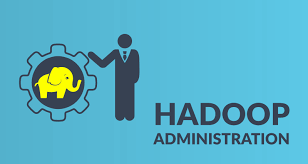Course information
HADOOP ADMINISTRATION: With increased enterprise adoption of Hadoop, organizations are in need of Hadoop administrators to take care of the large Hadoop clusters they have. The job role of a Hadoop administrator is strong and the job’s outlook is healthy, with an average of 7300 Hadoop admin jobs in US as of 19th Sept, 2022. A Hadoop administrator’s job role is unspectacular but is necessary to keep Hadoop clusters running smoothly in production, so a Hadoop admin job involves being the nuts and bolts of the business. Some people have a fairly fizzy idea on what does a Hadoop Administrator do and how to become one, so we thought it would be helpful to take a detailed look at Hadoop Admin job roles and responsibilities and the path prospective Hadoop admins can take to pursue a career in Hadoop administration.
LEO SOFT IT Big Data Hadoop Administrator Certification Training will guide you to gain expertise in maintaining complex Hadoop Clusters. This Hadoop Admin Course, you will learn exclusive Hadoop Admin activities like Planning of the Cluster, Installation, Cluster Configuration, Cluster Monitoring and Tuning. Furthermore, you will get to know about Cloudera Hadoop 2.0, and you will be mastering the security implementation and Hadoop v2 through industry-level cases studies.
The Hadoop admin training enables you to work with the versatile frameworks of the Apache Hadoop ecosystem.
Hadoop Developer/Admin Training – Course Content
Training Objectives of Hadoop Developer/Admin:
Hadoop Admin Course will provide the basic concepts of MapReduce applications developed using Hadoop, including a close look at framework components, use of Hadoop for a variety of data analysis tasks, and numerous examples of Hadoop in action. This course will further examine related technologies such as Hive, Pig, and Apache Accumulo.
Target Students / Prerequisites:
Students must be belonging to IT Background and familiar with Concepts in Java and Linux
Hadoop Architecture:
Introduction to
- Parallel Computer vs. Distributed Computing
- How to install Hadoop on your system
- How to install Hadoop cluster on multiple
- Hadoop Daemons introduction: NameNode, DataNode, JobTracker, TaskTracker
- Exploring HDFS (Hadoop Distributed File System) Exploring the HDFS Apache Web UI
- NameNode architecture (EditLog, FsImage, location of replicas) Secondary NameNode architecture
- DataNode architecture
MapReduce Architecture:
- Exploring JobTracker/TaskTracker
- How a client submits a Map-Reduce job
- Exploring Mapper/Reducer/Combiner
- Shuffle: Sort & Partition
- Input/output formats
- Job Scheduling (FIFO, Fair Scheduler, Capacity Scheduler) Exploring the Apache MapReduce Web UI
Hadoop Developer Tasks:
- Writing a map-reduce programme
- Reading and writing data using
- Java Hadoop Eclipse integration
- Mapper in details
- Reducer in details
- Using Combiners
- Reducing Intermediate Data with Combiners
- Writing Partitioners for Better Load
- Balancing Sorting in HDFS
- Searching in HDFS
- Indexing in HDFS
- Hands-On Exercise
Hadoop Administrative Tasks:
- Routine Administrative Procedures
- Understanding dfsadmin and mradmin Block Scanner, Balancer
- Health Check & Safe mode
- DataNode commissioning/decommissioning
- Monitoring and Debugging on a production
- cluster NameNode Back up and Recovery
- ACL (Access control list) Upgrading Hadoop
HBase Architecture:
- Introduction to HBase
- HBase vs. RDBMS
- Exploring HBase Master & region server
- Column Families and Regions
- Basic HBase shell commands.
Hive Architecture:
- Introduction to Hive
- HBase vs Hive
- Installation of Hive
- HQL (Hive query language)
- Basic Hive commands
Pig Architecture:
- Introduction to Pig
- Installation of Pig on your system
- Basic Pig commands
- Hands-On Exercise
Sqoop Architecture:
- Introduction to Sqoop
- Installation of Sqoop on your system
- Import/Export data from RDBMS to HDFS
- Import/Export data from RDBMS to HBase
- Import/Export data from RDBMS to Hive
- Hands-On Exercise
Mini Project / POC ( Proof of Concept ):
- Facebook-Hive POC
- Usages of Hadoop/Hive @ Facebook
- Static & dynamic partitioning
- UDF ( User defined functions )
Course Information
- Course: HADOOP ADMINISTRATION
- Company: ArchiTech IT
- Course Content: Available
- Course Duration: 40-45 Days
- Session Recording: Lifetime Access

